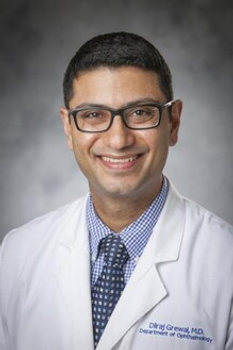Age-Related Macular Degeneration (ARMD) Overview
Learn About Age-Related Macular Degeneration (ARMD)
Common conditions include: Geographic Atrophy
Duke Eye Center
Glenn Jaffe is an Ophthalmologist and a General Surgeon in Durham, North Carolina. Dr. Jaffe is rated as an Elite provider by MediFind in the treatment of Age-Related Macular Degeneration (ARMD). His top areas of expertise are Age-Related Macular Degeneration (ARMD), Late-Onset Retinal Degeneration, Geographic Atrophy, Vitrectomy, and Trabeculectomy. Dr. Jaffe is currently accepting new patients.
Vitreous Retina Macula Consultants Of New York(Downtown)
Richard Spaide is an Ophthalmologist in New York, New York. Dr. Spaide is rated as an Elite provider by MediFind in the treatment of Age-Related Macular Degeneration (ARMD). His top areas of expertise are Age-Related Macular Degeneration (ARMD), Late-Onset Retinal Degeneration, Geographic Atrophy, Central Serous Chorioretinopathy, and Vitrectomy.
Duke Eye Center
Dilraj Grewal is an Ophthalmologist and a General Surgeon in Durham, North Carolina. Dr. Grewal is rated as an Elite provider by MediFind in the treatment of Age-Related Macular Degeneration (ARMD). His top areas of expertise are Uveitis, Age-Related Macular Degeneration (ARMD), Late-Onset Retinal Degeneration, Cataract Removal, and Vitrectomy. Dr. Grewal is currently accepting new patients.
Summary: The goal of this clinical trial is to learn if drug OPGx-BEST1 works to treat BVMD and ARB Bestrophinopathy. It will also learn about the safety of drug OPGx-BEST1. The main questions it aims to answer are: Evaluate the safety and tolerability of drug OPGx-BEST1 in one eye (the treatment eye), for 5 years post-injection, in participants with BVMD or ARB. A second question it aims to answer is iden...
Summary: Neovascular age-related macular degeneration (nAMD), also known as wet AMD, is the abnormal growth of new blood vessels in the light-sensitive tissue at the back of the eye called the retina. The purpose of this study is to assess how safe and effective Surabgene Lomparvovec is in treating participants with Neovascular age-related macular degeneration (nAMD). Surabgene Lomparvovec (ABBV-RGX-314) i...


